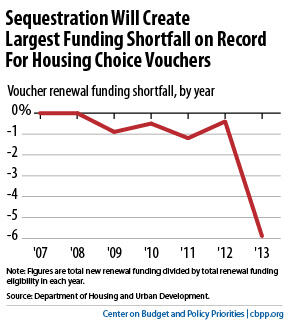BEYOND THE NUMBERS
For low-income families that need affordable rental housing, the news from Washington in recent years has been bleak. Yet, while President Obama’s new budget has shortcomings, it achieves the important goal of holding the ground on housing assistance in a very difficult budget environment.
For starters, the President and Congress agreed to deep cuts in federal housing assistance and community development programs in 2011 and 2012, and sequestration will slash more than another $2 billion from these programs this year. Because of sequestration, the Housing Choice Voucher program alone will assist as many as 140,000 fewer low-income families by early 2014, we estimate, exacerbating homelessness even as funding for homelessness prevention and re-housing homeless families also shrinks. This represents the largest shortfall in the program’s nearly 40-year history (see chart).

The cuts come at a time when the number of low-income families that need housing assistance has been rising substantially, there are long waiting lists for rental assistance in almost every community, and homelessness remains a persistent problem.
While sequestration is broadly unpopular, cancelling it will require the President and Congress to agree on deficit-reduction measures with which to replace it — an option that carries risks for safety net programs such as Medicaid and food stamps.
Meanwhile, President Obama has released his 2014 budget. The budget achieves the important goal of holding the ground on housing assistance and other safety net programs in this strained budget environment. It does this in three ways:
- It would replace sequestration with a more balanced package of revenue increases and spending cuts that largely protects safety net programs. An approach that relies solely on cuts would devastate housing assistance over time.
- It would prioritize low-income programs, including housing, for scarce discretionary resources. The President would increase funding for Housing and Urban Development (HUD) programs by $4.3 billion, or 10 percent, above the pre-sequestration funding levels of 2012, and his proposal also prioritizes rental assistance renewals and homeless assistance — areas that have the most significant and immediate impact on low-income families.
- It would adopt program reforms that reduce HUD program costs without harming low-income families. The President’s budget proposes important reforms to streamline rental assistance programs, while largely protecting low-income households. Such reforms are essential to stretching HUD dollars further over the next decade. The budget also funds initiatives that could help to preserve and improve a substantial share of the public housing stock.
While the President’s budget is a vast improvement over the status quo of the sequester (and the House budget resolution), it falls short in some areas. Notably, it appears to lock in the deep cuts already made in programs such as HOME (a block grant that supports rental housing and homeownership), and its deficit-reduction package would cut another $100 billion from non-defense discretionary programs, including housing, over the next decade.
And, it offers little to meet the enormous challenge of helping the millions of unassisted families with “worst-case” housing needs. To meet this challenge, we must look for opportunities that lie outside the traditional box of discretionary housing programs, such as reforming the tax code — including the host of special tax breaks called “tax expenditures” — as well as restructuring Fannie Mae and Freddie Mac and, more broadly, federal housing finance.
For instance, as policymakers consider reforming tax expenditures, it makes sense to pursue a renters’ credit. If capped at $5 billion, such a credit could reduce rents by an average of $400 per month for 1.2 million of the lowest-income renter households, lifting four of five of the poorest families it assists out of deep poverty.
